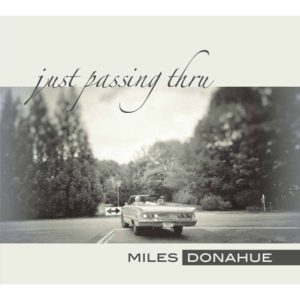 Boston-based saxophone player Miles Donahue leads his jazz band on a journey on Just Passing Thru, a 9 track odyssey into a myriad of approaches to modern jazz. Donahue constructs his sonic landscapes from the timbres, tempos, and dynamics he’s been listening to these last four decades, and he has a way of making jazz familiar to fans of other genres.
Boston-based saxophone player Miles Donahue leads his jazz band on a journey on Just Passing Thru, a 9 track odyssey into a myriad of approaches to modern jazz. Donahue constructs his sonic landscapes from the timbres, tempos, and dynamics he’s been listening to these last four decades, and he has a way of making jazz familiar to fans of other genres.
Opening track “Hear My Word” owes much to drummer Larry Finn’s seemingly simple drum beat. It lets guest keyboardist Steve Hunt have some space to sprinkle a lot of bright notes over the piece. Donahue’s saxophone uses it all as a platform to launch his mellifluous melody line, a polite, unobtrusive presence that takes a flight of fancy. It’s the variety of motions created by each instrumentalist that makes this song work. For example, Donahue’s sax line grows wider after the keyboards sway to the outer perimeter of the piece.
“Living Room Blues” finds these jazz cats swinging around a more danceable beat. A hipster sax line from Donahue reminds of all those hip cat daddy-ohs in beatnik coffee shops listening to the latest. Joe Santerre’s electric bass gets an elastic workout, his low notes nudged into something that tap dances around keyboardist Alain Mallet’s piano bar melody line. Mallet brings his own swing to this bold, fulsome number, his lift coming from a plethora of speedy notes. This tune makes it on vibe, a feeling it conjures of being in a place where the coolest people gather to hear the coolest jazz.
Donahue takes his saxophone up high to capture the romantic soul of “Killing Me Softly.” He replaces the voice of the original with a dandy of a melody line. He can make his sax as free as a human voice. His sudden notes and brief sustains capture a naturalness of the voice as well the pining for love. The remainder of the band provide a juicy, pulpy support, a base of notes that gain strength from their assemble playing. Mallet chimes in, too, with a fancy tap dance of notes that takes this piece in a new direction before Donahue returns to the main melodic theme.
Title track “Just Passing Thru“ gets a moody opener from Mallet‘s keyboard, gentle touches that feel like rain drops on a darkened day. Donahue‘s steady flair for evenness completes the feeling of one just being in a town for a few days before moving on. The melody line connotes both independence as well as the joy of being able to briefly take in the sights, found especially in Hunt‘s organ swirls. This can also be felt in how Donahue makes his melody line climb higher and higher in expression, like he‘s taking us into a better world after a brief weekend stint on earth.
“Donny’s Groove” rides a bulbous low end line. It’s all about that groove. Traveling over that funkiness is a contrasting spiral of saxophone notes that snake all over the sonic landscape. Mallet’s keyboard pumps out a tingling sensation, bright lights that feel electrified as they shine and move about as if greased. Sax and keyboard make the most of what the rhythm section is laying down and their creative gymnastic over it fills this piece with huge momentum. Finn’s drum work here is full, brimming with as much muscular authority as Santerre’s electric bass bounce.
Loaded with numerous instrumental passages per instrument, “A Man Of Few Words” still feels, somehow, like a quiet presence. These fine players conjure a layered work yet each maintains a perfect level of unobtrusiveness. One can feel the presence of a man who says little even though they are all saying a lot about that man with their joyful self-restraint. Mallet’s persistent interval of piano notes sways around the groove. Meanwhile, Donahue’s sax line dances alongside that piano swoosh with an infusion of sunny day enthusiasm.
“7-9-65” feels as celebratory as a birthday party. Guest musician Mike Stern presses some serious notes out of his axe. He works up a bracing arc of a line, one that makes you feel all of the numerous notes its made up of as it smolders through the sonic landscape. Donahue’s confident entrance makes one appreciate his darting, dashing sax line. This one could compete with the rockers because of how fast and hard it hits.
Buttressed by the rhythm section and made even more gripping by guest player Stern, “Railroaded” is another high octane number for this band. Donahue’s thin sax line, Mallet’s slapping piano work, and the spirited atmosphere they create brings a charge to this piece. Donahue’s thin line snakes through some tight intervals with a slippery skill, making us wonder how he can whip out all of those expressive notes within one line. Stern enters the scene with a fierce line that stabs away at this sonic landscape like a surgeon cutting out his special area to smolder.
Close out track “Ireland” gets a sharp edge from guest guitarist Sal DiFusco whose guitar phrase brings us into this piece with verve. The phrase DiFusco develops is as free as a live wire with as much free lowing electricity. His guitar line also drives right into Joey Barbato’s old world accordion work. Larry Finns drum fills keep this rocking, setting the stage for Stern to emerge with his own lead guitar solo, a phrase that makes it sound like his guitar is crying out the melody. Donahue combines the old world accordion timbre with the driving electric guitar into a melodic phrase of his own, a swirling dervish of Celtic fun, a daring take on that old form of folk music.
Miles Donahue and his crew play fun, accessible jazz on Just Passing Through. Jazz aficionados will find much to enjoy here. Yet, this album could likely go over well with fans of fusion jazz and some fans of rock music. Donahue has an ear for what we have all been listening to for the last 40 years, and he’s refined those timbres, drum fills, and aggression through a fine lens, distilling it, then pouring it back into this enjoyable work, Just Passing Thru. It certainly helped to have Robbie Weymouth record it and to have Jon Chase mix and master it at Jon Chase Productions in Methuen, Massachusetts. It takes receptive ears to find and record the perfect nuances in this album.

